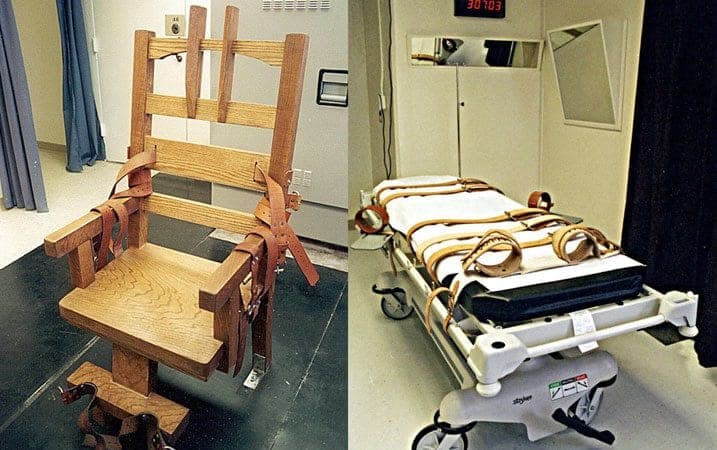ROME — Pope Francis appealed to Catholic leaders around the world to work to stop executions during this year, and said the death penalty should be abolished permanently.
“The commandment ‘You shall not kill’ has absolute value, and covers both the innocent and the guilty,” Francis said Sunday after his weekly Angelus prayer. “…even the criminal keeps the inviolable right to life, a gift from God.”
“I appeal to the conscience of the rulers, so that we achieve an international consensus for the abolition of the death penalty,” Francis told the thousands gathered in St. Peter’s Square. “And I propose to those among them who are Catholics to make a courageous and exemplary gesture that no sentence is executed in this Holy Year of Mercy.”
Francis’ Holy Year of Mercy, which started Dec. 8, the Feast of the Immaculate Conception and the 50th anniversary of the closing of Vatican II, and ends on the Solemnity of Christ the King on Nov. 20, encourages Catholics to show mercy in every aspect of their lives.
His words came on the eve of an international conference organized by the Community of Sant’Egidio, a new movement in the Catholic Church, being held in Rome Monday and Tuesday. The conference is titled, “A World without the Death Penalty.”
The pontiff said he hoped the event would give renewed impetus to the commitment to abolish capital punishment, saying that everyone deserves the chance for redemption.
As he did in the last day of his recent visit to Mexico, the pope also condemned the current justice system, saying that it needs to be ever more in line “with human dignity and to God’s plan for man and society,” calling for a justice system that gives “hope for social reintegration.”
On Wednesday, when he was in Ciudad Juarez, Francis visited Cereso 3 state prison, labeled by some as Mexico’s “Crime University.” There, he addressed 3,000 inmates in a speech that was broadcasted live in 389 prisons throughout Mexico, with an estimated 254,000 prisoners watching the feed.
“We have already lost many decades thinking and believing that everything will be resolved by isolating, separating, incarcerating, and ridding ourselves of problems, believing that these policies really solve problems,” Francis said during a visit largely overshadowed by his stop at the US-Mexico border.
Last September, when he became the first pope to address a joint session of the US Congress, Francis made a similar appeal, calling for the global abolition of the death penalty.
According to Death Penalty Information Center, there are 2,959 inmates in the United States awaiting execution. The other 36 countries where the death penalty is legal and has been used in the past 10 years include China, Japan, North Korea, Syria, Iran, and Pakistan.
Soon after Francis made his appeal, the Saint’Egidio Community released a statement saying that in a world where terrorism and violence are widespread, it’s possible for governments to want to re-introduce the death penalty, responding to violence with more violence.
“It’s necessary to cure nations of the fascination with resentment and revenge, as it’s true that, even when executions decrease, in some areas of the world extrajudicial killings and lynchings become more frequent,” they said.
Francis’s appeal builds on the teaching of recent popes. In 2000, for instance, St. John Paul II issued an appeal for “the death penalty, an unworthy punishment still used in some countries,” to be “abolished throughout the world” during a visit to Rome’s Regina Coeli prison.
The Catechism of the Catholic Church, the official compendium of Church teaching issued under John Paul, states: “If non-lethal means are sufficient to defend and protect peoples safety from the aggressor, authority will limit itself to such means, as these are more in keeping with the concrete conditions of the common good and more in conformity with the dignity of the human person.”

















